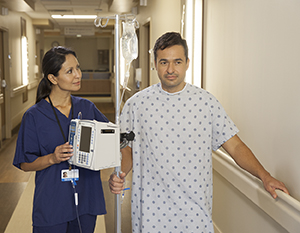Colorectal Surgery: Recovering in the Hospital and at Home
Colorectal Surgery: Recovering in the Hospital and at Home

Right after surgery
If you have a urinary catheter, it will probably be removed shortly after surgery. Your intravenous (IV) line will remain in place for a few days to give you fluids. And you’ll continue to receive medicine for pain. Soon after surgery, you’ll be up and walking around. This helps improve blood flow and prevent blood clots. It also helps your bowels return to normal. You’ll be given breathing exercises to keep your lungs clear.
If a stoma was created during surgery, your healthcare providers will show you how to care for your stoma.
Eating again
You won’t eat or drink anything until your colon begins working again. When this happens, you’ll begin with a liquid diet. After that, you’ll be given solid foods according to your healthcare provider’s instructions.
Recovering at home
In most cases, you’ll visit your healthcare provider shortly after leaving the hospital. You can get back to your normal routine about a month or two after surgery. Full recovery may take 4 to 6 weeks or longer. While your body heals, you may tire more easily. You also are likely to have some bloating. Loose stools and more frequent bowel movements are common after bowel surgery. This may get better over time, but may never disappear completely.
Resuming everyday activities
Being active helps your body heal. But you must protect your healing incisions. Follow these guidelines:
Walk as much as you feel up to.
Avoid heavy lifting or vigorous exercise until your healthcare provider says it’s OK. Follow your healthcare provider’s advice about climbing stairs and bathing.
You can drive when you’re no longer taking pain medicines and when you're able to depress the brake pedal without hesitation.
When to call your healthcare provider
Call your healthcare provider if you have any of the following after surgery:
Fever of 100.4°F (38°C) or higher, or as directed by your healthcare provider
Persistent nausea or vomiting
Unusual redness, swelling, or pain around your incision
Severe constipation or diarrhea
Worsening pain in the belly or around the stoma
Updated:
October 08, 2017
Reviewed By:
Adler, Liora C., MD,Image reviewed by StayWell art team.,Sather, Rita, RN